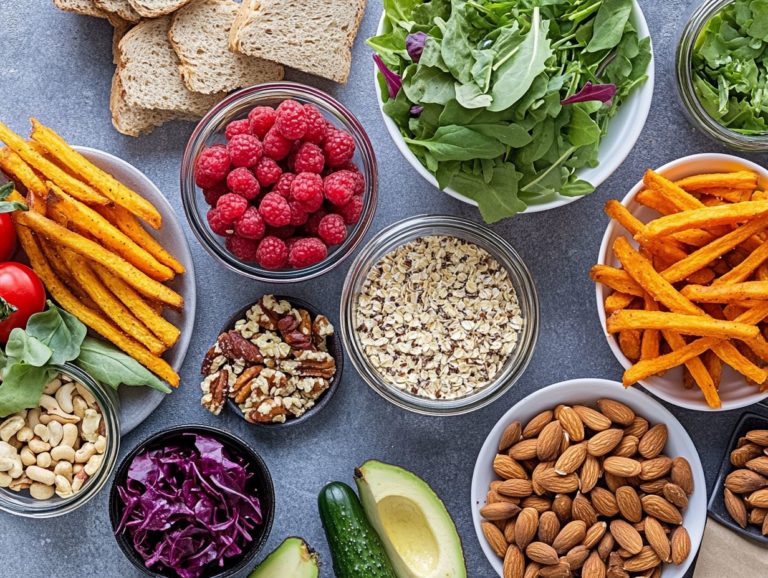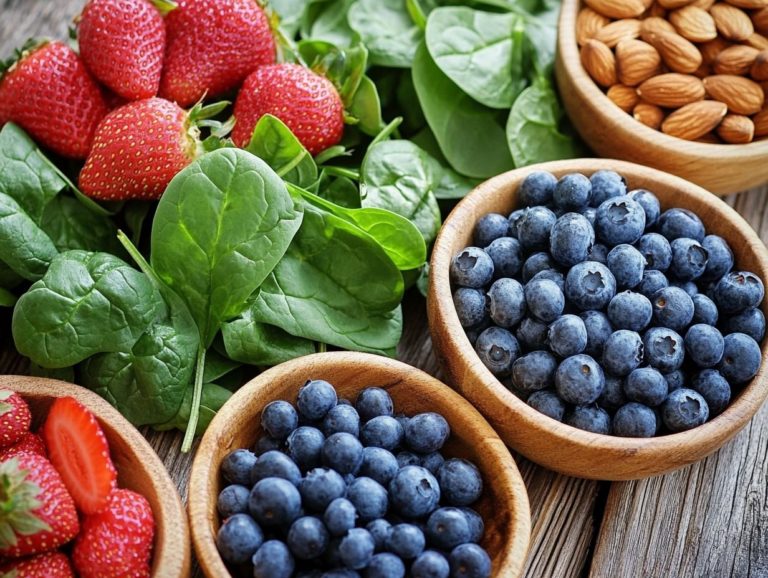How Can I Improve My Eating Habits?
Eating habits significantly impact your health and well-being, shaping everything from your energy levels to your mood.
Whether you re navigating occasional cravings or contemplating a complete dietary overhaul, grasping your eating patterns is the essential first step toward meaningful change.
This article delves into the essence of eating habits, highlights common unhealthy patterns, and presents practical strategies for cultivating a balanced diet. This article also provides insights into maintaining healthy habits and when to seek professional guidance.
Transforming your relationship with food is possible, and you can start today!
Contents
- Key Takeaways:
- Understanding Eating Habits
- Identifying Unhealthy Eating Habits
- Strategies for Improving Eating Habits
- Tips for Maintaining Healthy Eating Habits
- Seeking Professional Help
- Frequently Asked Questions
- Can tracking my food intake help improve my eating habits?
- What are some tips for making healthier food choices?
- How can I resist unhealthy food cravings?
- Are there any foods I should avoid for better eating habits?
- Can I still enjoy my favorite foods while improving my eating habits?
- How can I make sustainable changes to my eating habits?
Key Takeaways:

Understand the impact of your eating habits on your overall health and well-being.
Identify common unhealthy eating patterns and make sustainable changes to improve your diet.
Incorporate variety and moderation, and seek professional help when needed to maintain healthy eating habits for the long term.
Understanding Eating Habits
Your eating habits are crucial for a balanced diet and informed choices. Understanding your eating habits is essential for making informed, healthful choices that enhance your overall well-being.
Your eating habits encompass the regular consumption of food and beverages, shaped by many factors, including emotions, cultural influences, and the resources at your disposal.
By looking into these habits, you can uncover patterns that may affect your health, such as portion control, meal frequency, and food preferences.
This thorough understanding enables you to make dietary adjustments that align with recommended guidelines, foster nutrition education, and ultimately lead to improved health outcomes like disease prevention.
Defining Eating Habits and Their Impact
Your eating habits are the consistent patterns of food consumption that you develop over time, and they play a significant role in your overall health and well-being. These habits encompass a wide array of behaviors, from the types of foods you choose to the timing of your meals, ultimately shaping your approach to nutrition.
Various factors contribute to the formation of these eating patterns, including cultural influences, social interactions, and emotional states. The psychological aspects behind your food choices can lead to either positive or negative health outcomes, underscoring the importance of being aware of your eating behaviors.
By adopting practices such as healthy eating and mindful eating, which involves paying attention to your food choices and savoring each bite, you can experience improved health benefits, including making more nutrient-rich choices and enhancing your quality of life.
Identifying Unhealthy Eating Habits
Identifying unhealthy eating habits is crucial for you to make informed dietary changes that enhance your overall health and help prevent chronic diseases.
By recognizing these patterns, you enable yourself to take charge of your nutrition and foster a healthier lifestyle.
Common Unhealthy Eating Patterns
You may often find yourself falling into common unhealthy eating patterns, like reaching for added sugars, processed foods, or skipping meals altogether usually triggered by emotional eating or sudden snack cravings.
These habits can arise from various sources, such as stress, boredom, or social pressures, leading you to seek solace in sugary treats and convenient snacks.
However, the consequences of these choices can be significant, potentially leading to weight gain, fatigue, and a host of health issues. Emotional eating can create a relentless cycle: the comfort food you crave might quickly be followed by feelings of guilt, which only fuels further poor nutritional choices.
Understanding these underlying factors is crucial for addressing unhealthy eating behaviors, enabling you to make more informed decisions about the food that genuinely nourishes both your body and mind.
Strategies for Improving Eating Habits

By implementing effective strategies to improve your eating habits, you can significantly enhance your health and cultivate a more balanced diet through practical dietary changes.
Start making small changes today for better health and nutrition!
Creating a Balanced Diet
A balanced diet means enjoying a variety of foods. Focus on proteins, vegetables, fruits, and healthy fats to meet your nutritional needs.
Select a wide variety of foods to get essential vitamins and minerals. This helps you avoid nutritional deficiencies.
Low-mercury fish like salmon and sardines are great sources of omega-3 fats. These fats are important for heart and brain health.
Plant-based proteins like lentils, beans, and quinoa boost your protein intake. They also provide fiber, which is essential for digestion.
Mixing these choices into your meals brings exciting flavors and textures. You’ll promote your well-being and achieve your dietary goals.
Making Sustainable Changes
Transforming your eating habits requires real commitment. Embrace nutrition education and make healthy substitutions.
As you gradually add plant-based meals, you ll help the environment and enjoy a variety of flavors. Use seasonal ingredients and shop at local farmers’ markets.
Meal prepping can make cooking easier. It allows you to enjoy delicious, sustainable dishes without stress.
Tips for Maintaining Healthy Eating Habits
Maintaining healthy habits starts with mindful eating. A food journal helps you track your choices and progress.
Variety is crucial for long-term success. It keeps meals interesting and provides a wider range of nutrients.
Incorporating Variety and Moderation
Mixing variety and moderation in your diet ensures you get the nutrients you need. It also prevents boring meals.
Explore different food groups for essential vitamins and minerals. Rotate through fruits, vegetables, grains, and proteins to keep meals exciting.
Snack in moderation with options like mixed nuts or yogurt with berries. This satisfies cravings without hindering your health goals.
Managing Cravings and Emotional Eating

Managing cravings is key to maintaining healthy habits. Recognize what triggers your cravings beyond physical hunger.
Mindful eating helps you focus on flavors and sensations. It helps you tell the difference between real hunger and emotional urges.
This awareness allows you to make better choices. You can also find healthier alternatives to address cravings.
Seeking Professional Help
Getting help from a therapist or nutrition counselor can be valuable. They provide support and strategies for improving your health.
Investing in expert guidance helps you make meaningful changes. Tailored advice can greatly enhance your well-being.
When to Consider Therapy or Nutrition Counseling
Considering therapy or nutrition counseling is vital when emotional eating or persistent unhealthy eating patterns block your dietary changes and health improvement.
Recognizing when your struggle with food goes beyond just trying harder is key. Frequent cravings triggered by stress, anxiety, or sadness are signs that outside help may be beneficial.
Reaching out to a therapist or nutrition counselor can provide insights and strategies to help you break free from these cycles.
Therapy explores the psychological aspects of emotional eating. It equips you with coping strategies. Nutrition counseling offers personalized guidance on food choices and meal planning.
Together, these resources create a holistic approach to overcoming barriers and achieving your wellness goals.
Frequently Asked Questions
Can tracking my food intake help improve my eating habits?
Yes! Keeping a food diary or using an app makes you more aware of your eating habits. This can help you identify patterns and make needed changes.
What are some tips for making healthier food choices?

Here are some tips:
- Plan meals ahead
- Add more fruits and veggies
- Choose lean proteins
- Limit processed and high-fat foods
How can I resist unhealthy food cravings?
Having a plan is key! Keep healthy snacks handy, drink water to feel full, and find ways to cope with stress that don t involve food.
Are there any foods I should avoid for better eating habits?
Limit or avoid highly processed and high-fat foods, as well as foods with added sugars. Also, moderate alcohol and caffeine intake.
Can I still enjoy my favorite foods while improving my eating habits?
Absolutely! You don t have to cut out your favorites. Just practice moderation and look for healthier versions or include them in balanced meals.
How can I make sustainable changes to my eating habits?
Set realistic goals, find enjoyable physical activities, and surround yourself with supportive people. Consider seeking help from a registered dietitian for personalized guidance.





